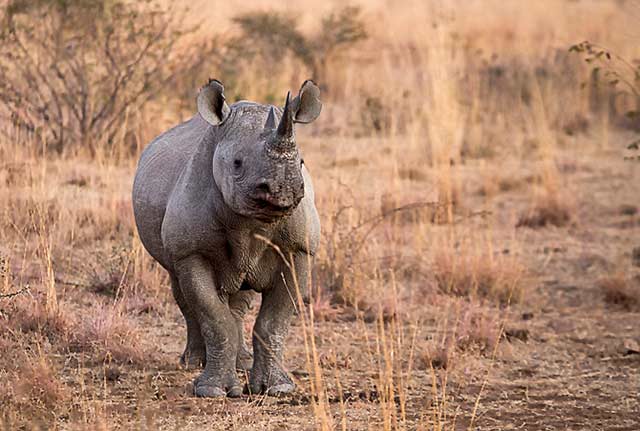
Black Rhinoceros
Smaller than the White Rhino, it has a pointed mouth and is a leaf eater.
It carries its head up from the ground and it has no hump on its back.
For many wildlife photographers, an African safari is high on their wish list. And for good reason – there is an abundance of animals and birds that can’t be found anywhere else in the world.
And now, you’ve decided to make your wish come true and need to decide which form of travel will best meet your needs. There is more than one way to plan your trip; travel alone or with a companion, join a tour company that organizes the entire trip for you or plan and organize your own small group tour.
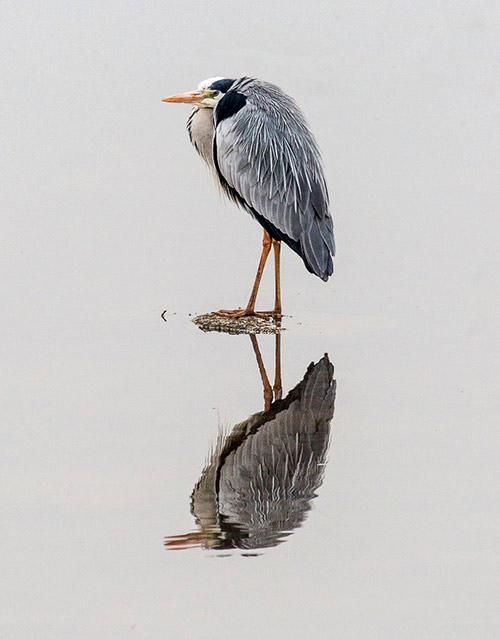
Grey Heron
I would like to share some tips on how to pull a private small group tour together so all can enjoy the adventures.
Note: These particular tips revolve around a South African Safari, but most of the tips can be applied to any small group photo trip.
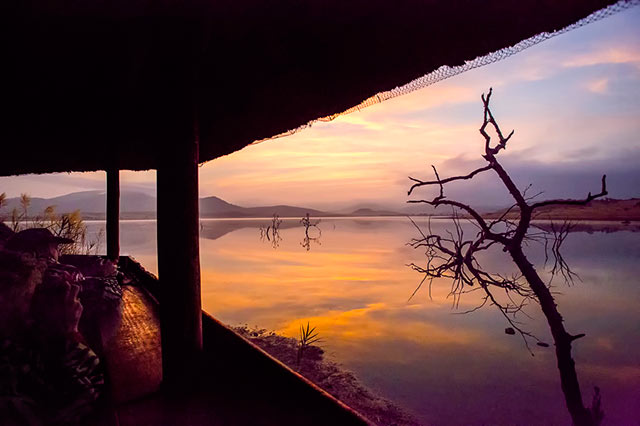
Photographers Creating Sunset Photos of the Mankwe Dam
Tip 1: Most Important – Travel with Other Experienced Photographers
If wildlife photography is your passion and purpose for planning a safari and you’ve chosen to travel with your own small group, I would highly recommend traveling with other photography friends or relatives, and if it’s with those whom you have traveled previously, even better. Why? You have common interests, know and respect each other’s travel habits and will be seeking to have the same kind of experience.
Hook up with other ‘seasoned’ photo travelers that have basically the same style of travel in mind – backpacking, staying at hostels, lodges, cottages or hotels. The more compatible you are, the higher the chances that all will equally enjoy the spirit of the venture.
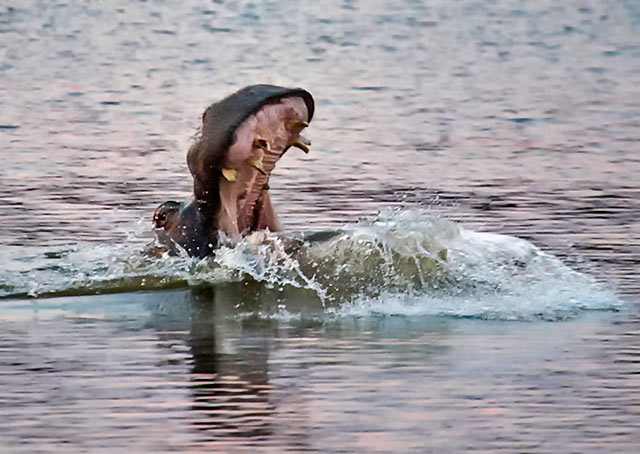
Hippopotamus yawn and display of teeth is a warning signal.
Tip 2: Research a Chosen Location
With eight knowledgeable photographers and ‘seasoned’ travelers ready to take a safari to Africa, the planning began. We talked about areas already visited by some and decided to choose an area that none of us had visited previously, so the search for uncommon territory was on.
Use the internet – study maps, articles, recommendations from others, photo guides, and even organized tour companies suggested trips to help you decide.
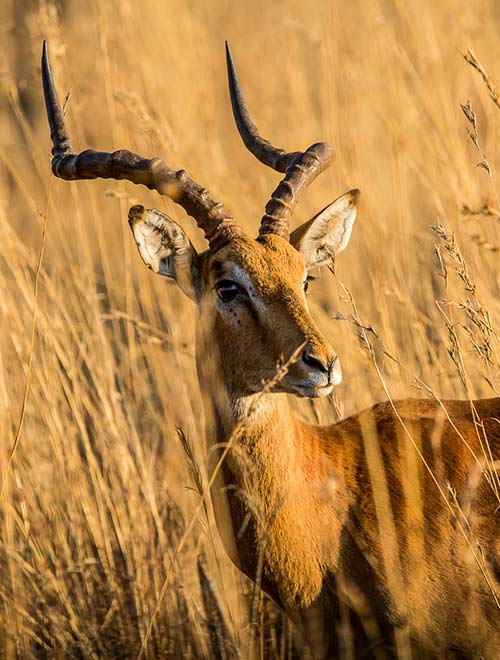
Impala in the Early Morning Light
After we all read the Pilanesberg National Park articles on Apogee Photo Magazine, it didn’t take us long to decide on the area we wanted to visit. Pilanesberg is the 4th largest national park in South Africa with many species of birds and animals not easily seen elsewhere and none of us had been to this location. The decision was made – this was the place for our new photography exploration.
Now, you’ll want to learn as much as possible about what to see, where to stay and what to expect in a region by doing more research. If you have limited time, choose your activities carefully. You won’t want to miss out on any photo opportunities.
Note: Since the writer of the APM articles, Mario Fazekas, had a book available on the area (The Photographer’s Guide to Pilanesberg National Park) we started our research there.
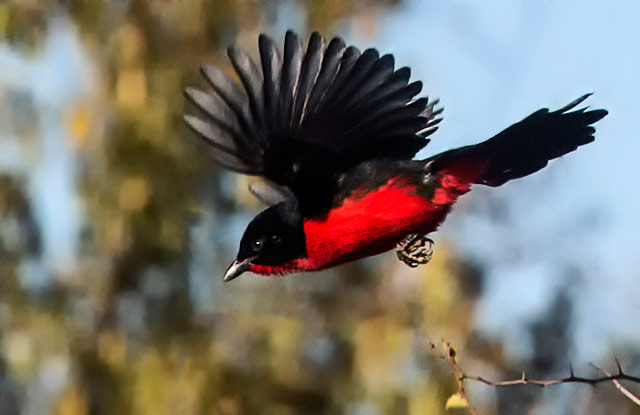
Crimson-breasted Shrike
Tip 3: Planning and ‘Booking’ the Small Group Trip
Planning a trip that includes many personalities can have its challenges, so divide up the various pre-trip tasks among everyone. Teamwork is important. All tasks were accomplished in a timely manner and the consensus of the group was taken into account on all of the details.
Planning and making reservations early is critical when booking your own group directly with the lodges and transportation companies, so start early – 10 to 12 months in advance of your departure date. This will provide more flexibility when arranging the desired itinerary.
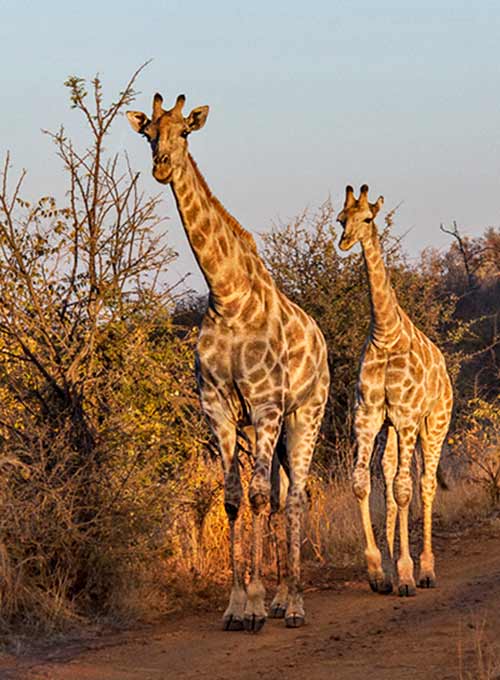
Mother Giraffe (a Cow) and Her Calf Strolling Down the Road in the Golden Light
We opted for a lodge experience rather than tenting, because those in our group were diversified in age. We wanted to maximize the photography and not worry about basic comfort issues.
Once decisions were made, each participant was responsible for their own payments to the various facilities.
Note: Traveling in a privately organized small group can work to your advantage. You are able to fill a safari vehicle with your own group, and you can ask for guides that will meet your photographic needs. Also, as good travel companions, everyone understands that rotating the “best seats” and even trading cameras on occasion to help everyone get the shot is helpful.
.jpg)
Southern Yellow-billed Hornbill
Tip 4: General Travel Logistics Lessons Learned
~ Rest upon arrival: Plan to arrive the day before the booked day-long tours begin. It allows you a bit of time to rest up, get accustomed to the local time zone and acquainted with your surroundings. If you arrive in the morning, schedule an easy activity for the remainder of the day – one that includes getting the circulation going in your legs again. If you arrive at night, you may want to plan something local for the next day. Taking that extra bit of time gets you refreshed before the big adventure officially starts.
~ Although your lodging and transportation were paid in advance, be sure to take a small amount of local currency for incidentals. Don’t forget to find out about tipping policies as well. The exchange rates at the airport or airport hotel were good and more convenient than looking for a bank or ATM.
~ Travel insurance would also be a smart choice.
~ Travel light. You don’t need a lot of clothes and will probably be too tired to fuss with more than just the basics. Make life easier and leave extras at home.
However, do know what the average local weather will be during the month of your scheduled travel. In our case it was winter in South Africa and knowing it would be cool to cold we brought jackets, hats, gloves and thermal underwear … and didn’t regret taking those items at all!
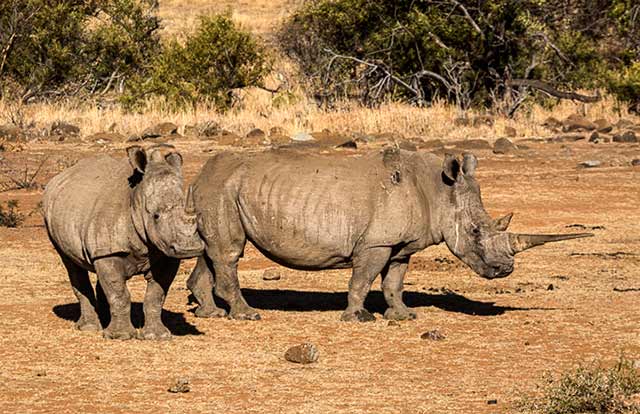
White Rhinoceros
It has a square mouth for eating grass, carries it’s head down close
to the ground, has a hump on it’s back, and is larger than the black rhino.
Tip 5: Game Runs Were Included
We chose to divide our trip between three locations that included game runs – travel from the lodge in an open vehicle to find the wildlife. You may choose longer or shorter stays at one or more locations, depending on your available travel days, but having the game runs included during the planning stage is a great way to go.
Be prepared for long days: Each facility had similar procedures and timing. The days were long and exhausting. In addition to the photography game runs, there is always the mid-day or nightly exercise of downloading and checking images.
Note: Don’t forget to clean your camera equipment and re-charge your camera batteries in preparation for the next day (yes, batteries – take more than one).
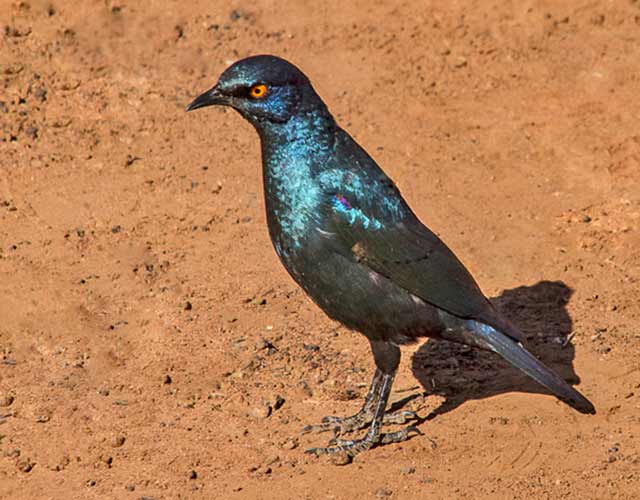
Cape Glossy Starling
Example of a typical day: Generally the day was planned around two game runs of about four hours each.
~ Wake-up call at around 5:30 a.m.: coffee and frequently a hard biscuit called a “rusk” was served
~ Seated in the open nine-passenger, graduated seat-height vehicle by 6 a.m. and ready for each new photo opportunity to begin
~ Return to the lodge for a full breakfast and some free time
~ 3 p.m.: High tea was served
~ 4 p.m.: Back into the vehicles for another four hour game run. Again, there was a break around sundown for a glass of wine and a snack
~ Immediately on our return, dinner was served
~ Then, check those photos, clean that gear, re-charge those batteries, and “early” to bed to re-charge your batteries for the next day
Resources:
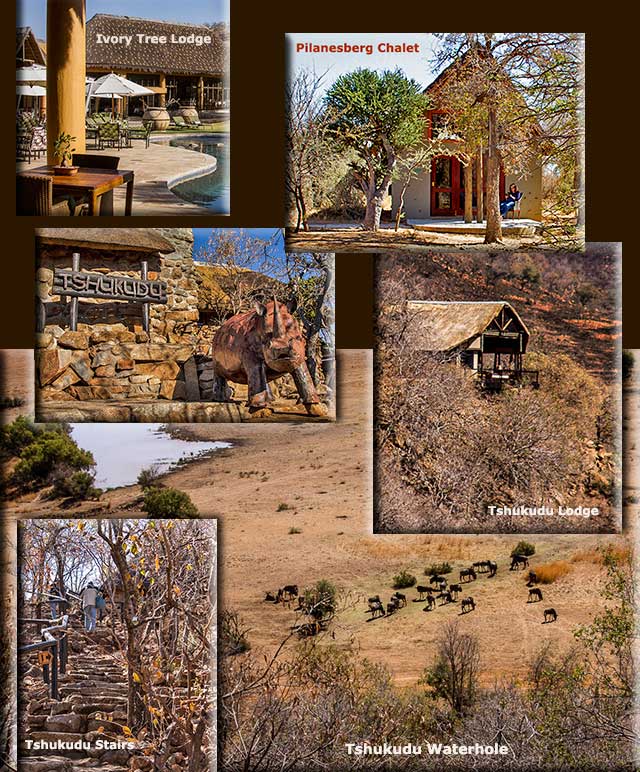
City Hopper Transport: For our transportation pick-up, drop off and all transfers from lodge to lodge within the park, arrangements were made through City Hopper. Charges had been prepaid for the transportation as well as the day trip to Lion Park. There was excellent service and the drivers were friendly, knowledgeable and helpful.
Pilanesberg Private Lodge: An outstanding lodge that was the simplest in ambiance within individual cottages. They were delightful with all comforts except for television and internet. They only have room for about 12 visitors at a time so you get individual care and attention. The food was outstanding with a signature dish called the Traditional South African Lamb Shank Potjie (stew) which is served in individual black kettles.
Ivory Tree Lodge: This is a beautiful lodge with many groups of individual cottages, but since it is very large, it can be equated to a hotel experience with few personal touches. The food was quite good and served buffet style.
Tsukudu Game Lodge (pronounced shu-ku-du and means rhinoceros): In order to stay at this beautiful lodge, you have to be able to navigate a steep flight of more than 130 rocky steps twice each day, but the effort is absolutely worth it. With room for only a few guests, the individual cottages were charming and designed for the comfort and care of their guests. The food was excellent and beautifully presented. It is extremely well run with superb game runs, impressive views and a private waterhole that is frequented by many animals.
In Part 2 we will share some of our experiences and lots of images of what we saw on our safari. You won’t want to miss seeing a few special animal and bird sightings, the lions and an unbelievably special moment with a two-week old baby elephant.
by Noella Ballenger
All text & photos: © 2013 Noella Ballenger. All rights reserved.




Leave a Reply